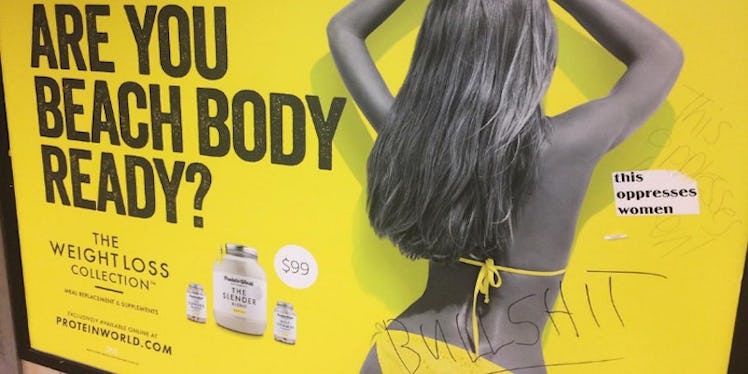
London To Ban Ads On Public Transportation That Promote Poor Body Image
Every time I see one of those subway ads about getting breast augmentation, it's impossible not to look at my own boobs and think, "Do I need that?" That's how ads on the subway work. You can't avoid looking at them, and sometimes they make you doubt your own appearance. It's awful.
Lots of people feel this way about subway ads. Last year, people had a huge issue with the infamous Protein World ad depicting a bikini-clad girl aggressively asking women if they were “beach body ready."
Several protests were sparked and a campaign called #EachBodysReady encouraged people to graffiti over the image. Another way people protested Protein World's ad was by placing stickers on the model that said, "This oppresses women."
Ads like this are not promoting a product, they're promoting the sexualization of women. It sucks, and it needs to end. Luckily, Sadiq Khan, the Mayor of London agrees. Now that the ads have appeared in London, and after he received hundreds of complaints, Khan pledged that, starting next month, they'll be banned from the entire Transport for London (TfL) network.
Khan plans to ban all advertising on the TfL that promotes an unhealthy body image. The TfL network's ads appear in the Tube, bus shelters, trams, the Victoria Coach Station and on buses.
This issue hits close to home for him because he has two teenage daughters. He's not into the idea that their self-images could be affected by ads with unrealistic body standards.
He also makes a great point that people who use the TfL can't just turn off ads they don't want to see or hear, like you can do on TV or the radio. You really don't have much of a choice but to look at the ads on public transportation.
Ads are meant to sell products by showing off the results or what consumers will get out of them, not throw subtle punches at consumers' self-esteem or "body shame" them. This is just one step toward promoting positive body image everywhere, and it's a good sign that positive body messages will become the new normal for public advertisements.